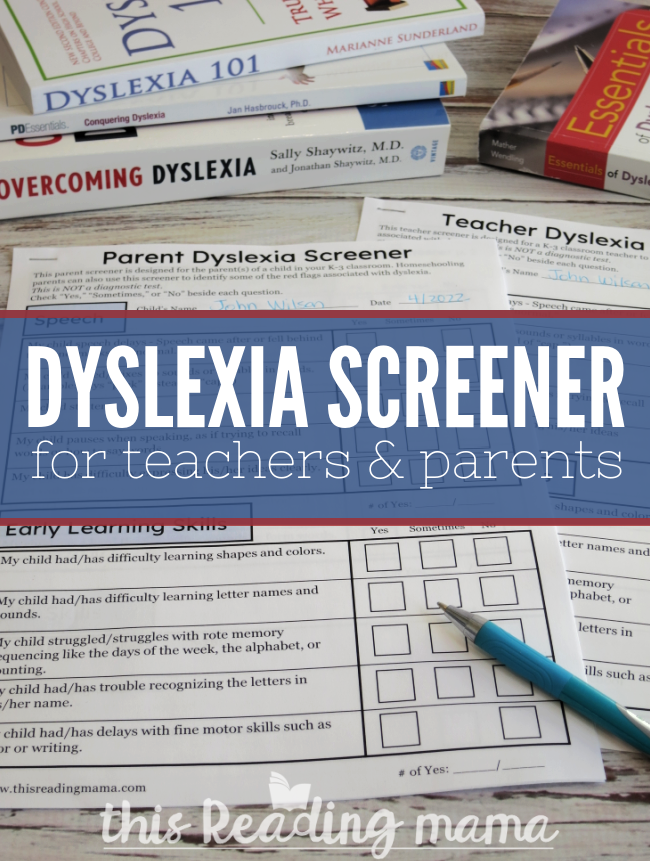Download our FREE Dyslexia Screener, designed for teachers, parents {and homeschoolers}.
Disclaimer: This screener is NOT a diagnostic test for dyslexia. Its purpose is to help you identify red flags associated with dyslexia. Further testing by a professional is needed to truly diagnose dyslexia.
Learn more about testing in my blog article, Getting Tested for Dyslexia.

This pack is for subscribers only! Not a subscriber? Subscribe HERE.
If you are already a newsletter subscriber, snag this freebie from the subscriber library. Enter the password, which can always be found at the bottom of your most current newsletter.
*Find the free screeners at the END of this post or in the subscriber library.
**I am a participant in the Amazon Services LLC Associates Program, an affiliate advertising program designed to provide a means for me to earn fees by linking to Amazon.com and affiliated sites. Click on the links below to find them on Amazon.
Free Dyslexia Screener – For Teachers, Parents, & Homeschoolers
If you suspect your own child or a child in your classroom may have* dyslexia, it can be helpful to use a free screener, like the one I’m sharing today, to help you identify some of the red flags associated with dyslexia.
*I want to clearly state again that this screener is NOT a diagnostic test. In order to get diagnosed with dyslexia, you must be evaluated by a professional.

TWO dyslexia screeners are included in this pack: A parent screener and a teacher screener. Why did I do that?
If the child goes to school, both the parent and teacher perspectives are super helpful.
If the child is homeschooled, consider giving a screener to a teacher in a co-op or a relative/friend who knows and has taught or seen your child in an educational setting.
Three Quick Notes about the Questions:
- It may feel as if the questionnaire has a negative tone to it by focusing on what your child or learner struggles to do. It was not intended to make it seem as if dyslexia is just negative. There are lots of positives or advantages to being dyslexic. Phrasing the questions the way I did simply made them easier to answer with “Yes,” “Sometimes,” and “No.”
- The screener was designed for K-5 learners. Not all of the questions will apply to your child/learner, especially if they are younger. Feel free to skip those or cross them out.
- Some of the behaviors on the screener are typical of younger children. For example, children who are just learning to write may reverse their b‘s and d‘s often. But if you are filling out the questionnaire for a child who is above first grade and still reversing b‘s and d‘s, that’s more of a red flag.
I love what Marianne says on her blog, Homeschooling with Dyslexia, “The more symptoms that are present, and the longer they persist, the more likely it is that your child/[student] may need some help. Dyslexia is marked by a combination of signs and a lack of progress over time.”
This is key. If you see that your learner has a combination of several signs AND a lack of progress over time, dyslexia should be considered.
What’s Included on the Dyslexia Screener?
The categories that are included on the screener are listed below with a couple of examples beside each.
- Speech and Expressive Language Skills – stuttering, speech delays, difficulty expressing ideas
- Early Learning Skills – learning shapes, letters, and days of the week
- Understanding Sounds in Words – rhyming, syllables, letter sounds in words
- Life Skills – organization, memory, concepts of time
- Reading Behaviors & Skills – history of reading problems in family, using context to read, comprehension
- Writing Behaviors & Skills – handwriting, spelling, copying from a book
- Math Behaviors & Skills* – skip counting, math logic
*You might think it strange to put math skills on this screener, but dyslexia and dyscalculia are often interrelated.

With each category, there are questions associated. As you answer “Yes,” “Sometimes,” and “No,” you can tally how many were “Yes” at the end of each section.
If you end of with three or more “Yes” checks in most of the categories AND the child has a close relative with reading difficulties and/or dyslexia, I would recommend that you get the child evaluated by a professional for dyslexia.
Enter Your Email Address Below or Hop over to the
Subscriber Library to Grab this FREE Screener!
Enjoy teaching!
~Becky
The post Dyslexia Screener {for Teachers and Parents} appeared first on This Reading Mama.